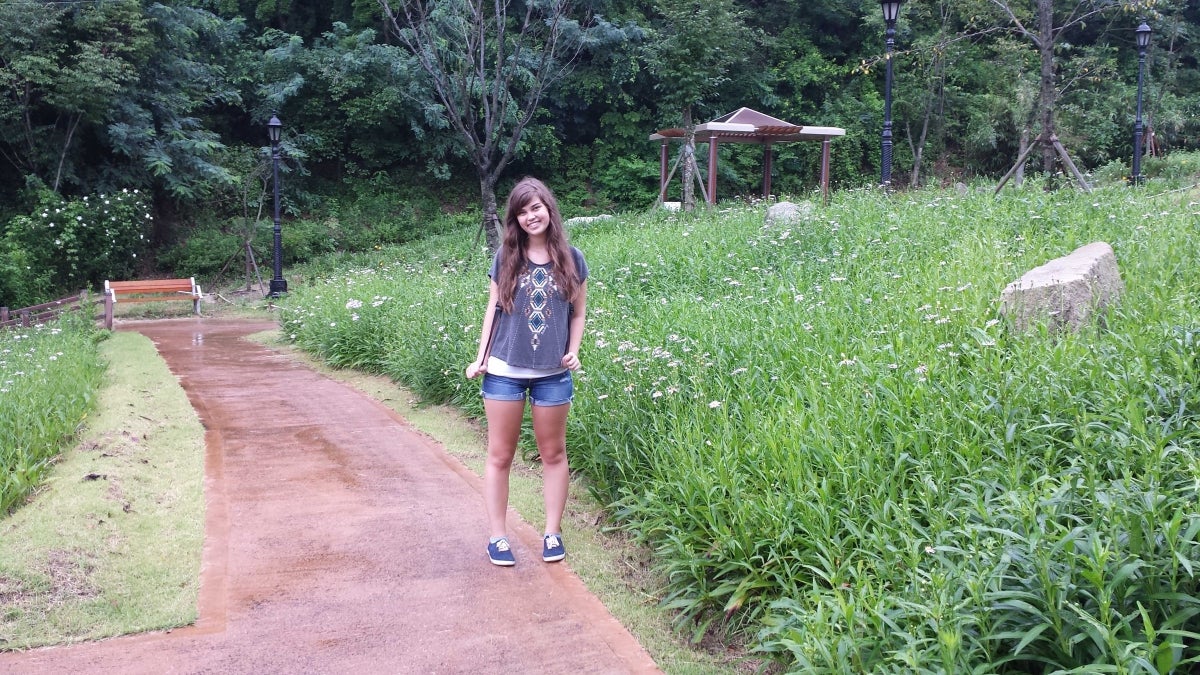Editor's note: This is part of a series of profiles for spring 2016 commencement. See the rest here.
When Bridget Harding began looking for jobs in her field of sustainability, she noticed something interesting about every interview she had — the first thing employers asked her about was her ability to speak Korean.
Harding, a senior majoring in sustainability, first encountered Korean in high school. She enjoyed the language so much that she chose it for her language requirement when she started at ASU, the only college in Arizona that offers the language. She continued to enjoy it and went beyond the required two years, taking upper-level courses in the School of International Letters and Cultures into her junior and senior years.
Harding went on to study abroad in South Korea in 2013, where she noticed the overlap between her studies in ecosystems and her ability to speak Korean. She became interested in the East vs. West perspectives on nature and ecology. In Eastern cultures, people often see themselves as part of nature, while in Western culture nature is often viewed as a place of resources, she said.
“I think it’s important to study abroad no matter what your major is,” Harding said. “You can learn a lot about yourself and the world, and apply that to what you want to do.”
The summer of 2015, during her sophomore year, Harding applied for a research position with the National Science Foundation, hoping to study insect and riparian environments. During the interview, the first thing they noticed was her language skills.
“I hadn’t taken entomology, but I was able to pick up the Latin terms based on being a language student,” Harding said. “They pointed out that my ability to learn a difficult language like Korean meant I could learn difficult computer programs as well.”
In the fall of that year, Harding then applied for an internship with the Nature Conservancy, When she received an interview, the interviewers were again curious about the Korean on her resume. This time, she said, she knew exactly what to say.
“I’d be able to learn their programs quickly,” Harding explained. She would need to learn GIS, or geographic information systems, a key part of the Nature Conservancy’s work. Harding realized that knowing how to piece together a difficult language like Korean would give her the skills she needed to grasp the new program easily.
During her time at the Nature Conservancy, Harding began thinking about how she wanted to spend her time after graduation. With the encouragement and support from professors in SILC (Dr. Ebru Turker) and sustainability, she applied for the Fulbright Scholarship Program in South Korea.
“You don’t have to know the language to be accepted, but since I do, I thought I would have an edge,” Harding said.
Harding will leave for South Korea this July, and will live with a South Korean family during her stay. She will be placed in a classroom as a full-time English teaching assistant, creating lesson plans and practicing conversational skills with the students. Although the program will last one year, Harding has the opportunity to extend it up to three years.
“I feel very welcomed there,” Harding said. “South Korea and the U.S. have a good relationship when it comes to Americans, and the culture is starting to come over here too.”
As an Arizona native, Harding wanted to take advantage of every opportunity at ASU.
“I tried to get as much out of college as possible,” she said. “It’s really rewarding in the end when you go to the country and people can really understand you, and it improves your confidence.”
After her time abroad, Harding will attend graduate school at the University of Washington Marine Affairs program. Ironically, one of the only other institutions that offers a master's degree in this field is located in South Korea. She hopes to one day work for NOAA, the National Oceanic and Atmospheric Administration, or continue with nonprofits like TNC.
Written by Sarah Edwards
More Arts, humanities and education

ASU professor's project helps students learn complex topics
One of Arizona State University’s top professors is using her signature research project to improve how college students learn…

Award-winning playwright shares her scriptwriting process with ASU students
Actions speak louder than words. That’s why award-winning playwright Y York is workshopping her latest play, "Becoming…

Exceeding great expectations in downtown Mesa
Anyone visiting downtown Mesa over the past couple of years has a lot to rave about: The bevy of restaurants, unique local shops…


